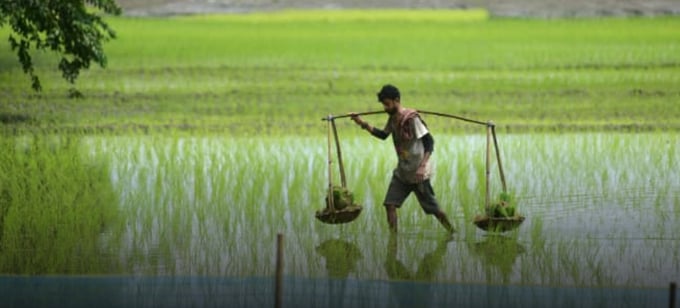June 16, 2025 | 22:51 GMT +7
June 16, 2025 | 22:51 GMT +7
Hotline: 0913.378.918
June 16, 2025 | 22:51 GMT +7
Hotline: 0913.378.918

India’s export ban on rice is reverberating through global rice markets, threatening food security if developing nations cannot afford or access rice.
India’s export ban on rice is reverberating through global rice markets, threatening food security if developing nations cannot afford or access rice.
“The only shortage out there right now would really be India’s plain, white, long grain, poor quality rice that they ship to a lot of countries throughout Africa and Southeast Asia,” Peter Bachmann, vice president of policy and government affairs, told CNBC. “And when they slap a ban in place, that impacted those developing countries the hardest and first.”
First, India banned exports of broken rice and imposed a 20% duty on exports of some rice varieties in September 2022.
Then, in July 2023, India banned exports of its plain, white, long-grain rice.
“India is a country that has suffered from food insecurity in a significant way, so there’s an understandable desire to ensure appropriate availability of staple foods like rice within the country,” Will Kletter, vice president of operations and strategy at ClimateAi, told CNBC.
“But there’s a trade-off to that.”
India’s rice exports make up 40% of the market, so any export bans quickly influence global prices.
Rice prices spiked 15% to 20%, hitting their highest in almost 12 years, according to the International Food Policy Research Institute.
″[India is] trying to secure enough rice in their domestic markets so their prices will drop for consumers,” Bachmann said.
Part of the problem is that despite facing the same rising input costs for energy and fertilizer, in comparison to other agricultural commodities, market prices for rice stayed relatively stable.
U.S. rice farmers face the same volatile rice prices.
“Our farmers, they’ll go up against any rice farmer,” Michael Klein, vice president of communications and domestic promotion at USA Rice, told CNBC. “But, they can’t compete with the foreign government.”
When U.S. rice farms struggled to stay profitable as global rice prices mismatched with rising input costs, Congress passed $250 million in supplemental funding.
“These programs exist just to stop these farmers from falling through the cracks because that would be a huge disaster,” Klein said.
(CNBC)

(VAN) Extensive licensing requirements raise concerns about intellectual property theft.

(VAN) As of Friday, a salmonella outbreak linked to a California egg producer had sickened at least 79 people. Of the infected people, 21 hospitalizations were reported, U.S. health officials said.

(VAN) With the war ongoing, many Ukrainian farmers and rural farming families face limited access to their land due to mines and lack the financial resources to purchase needed agricultural inputs.

(VAN) Vikas Rambal has quietly built a $5 billion business empire in manufacturing, property and solar, and catapulted onto the Rich List.

(VAN) Available cropland now at less than five percent, according to latest geospatial assessment from FAO and UNOSAT.

(VAN) Alt Carbon has raised $12 million in a seed round as it plans to scale its carbon dioxide removal work in the South Asian nation.

(VAN) Attempts to bring down the price of the Japanese staple have had little effect amid a cost-of-living crisis.